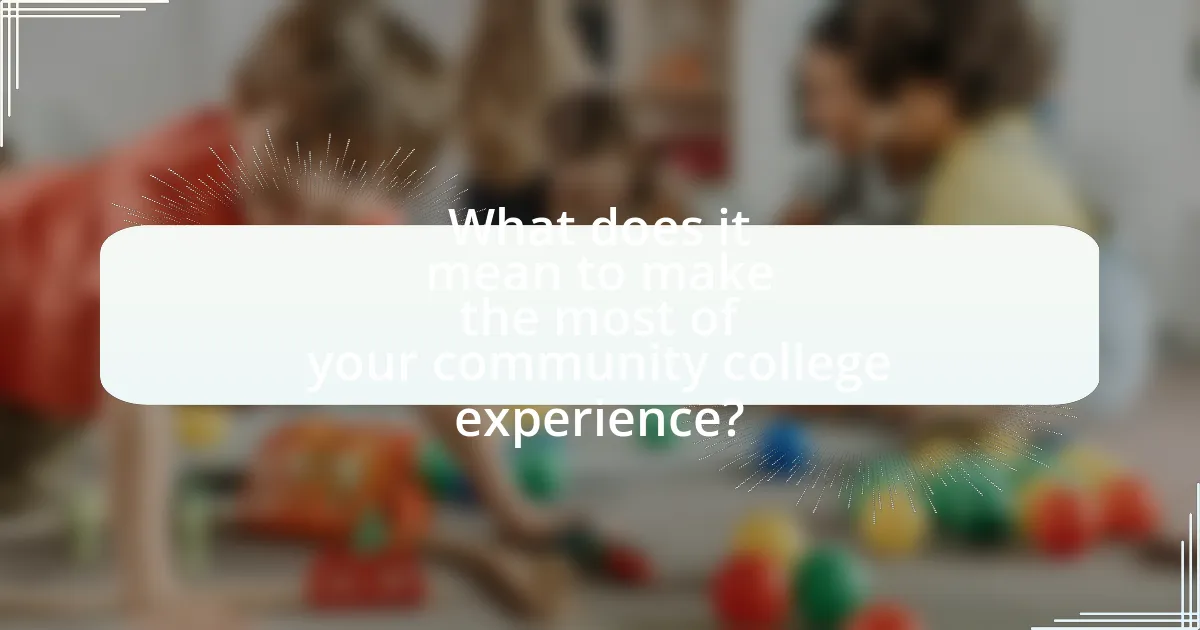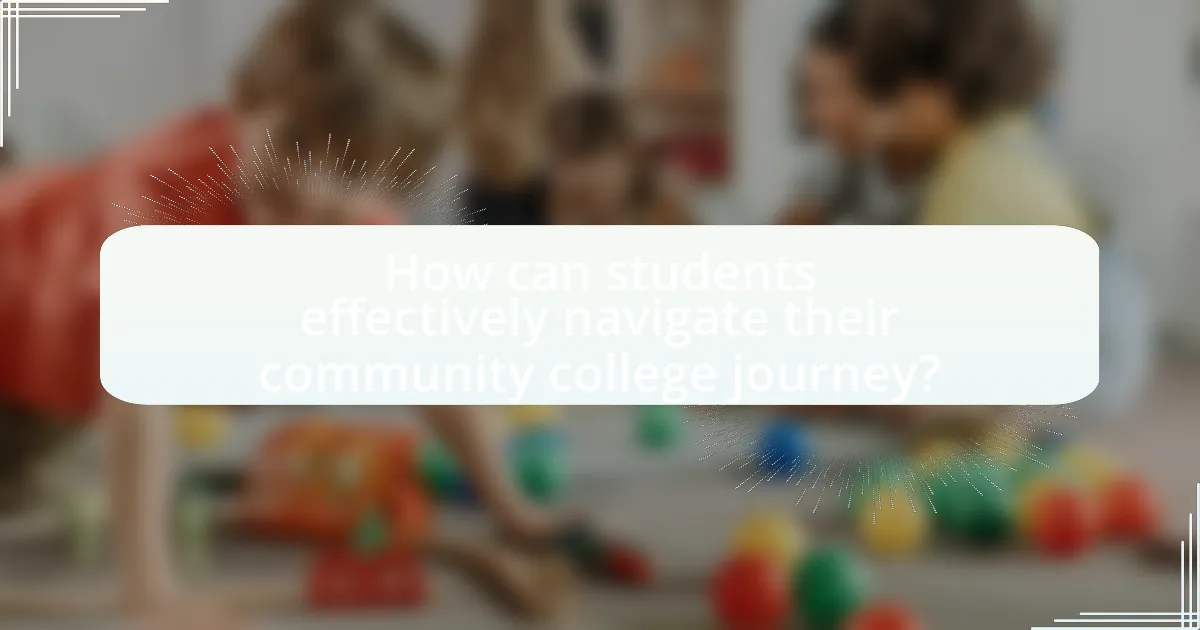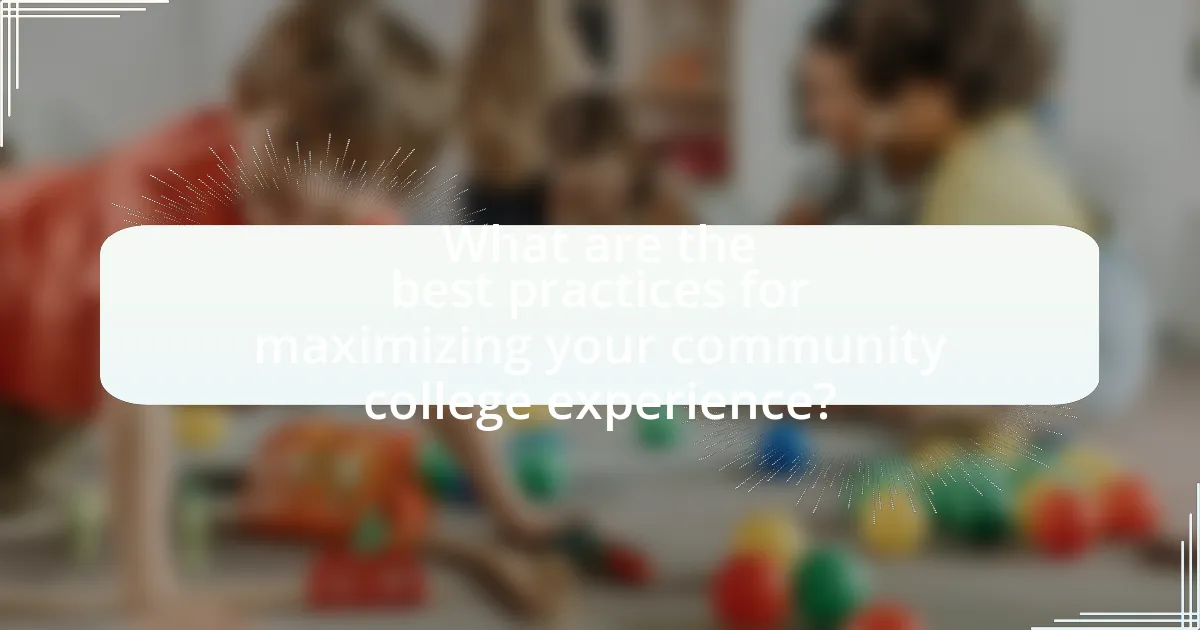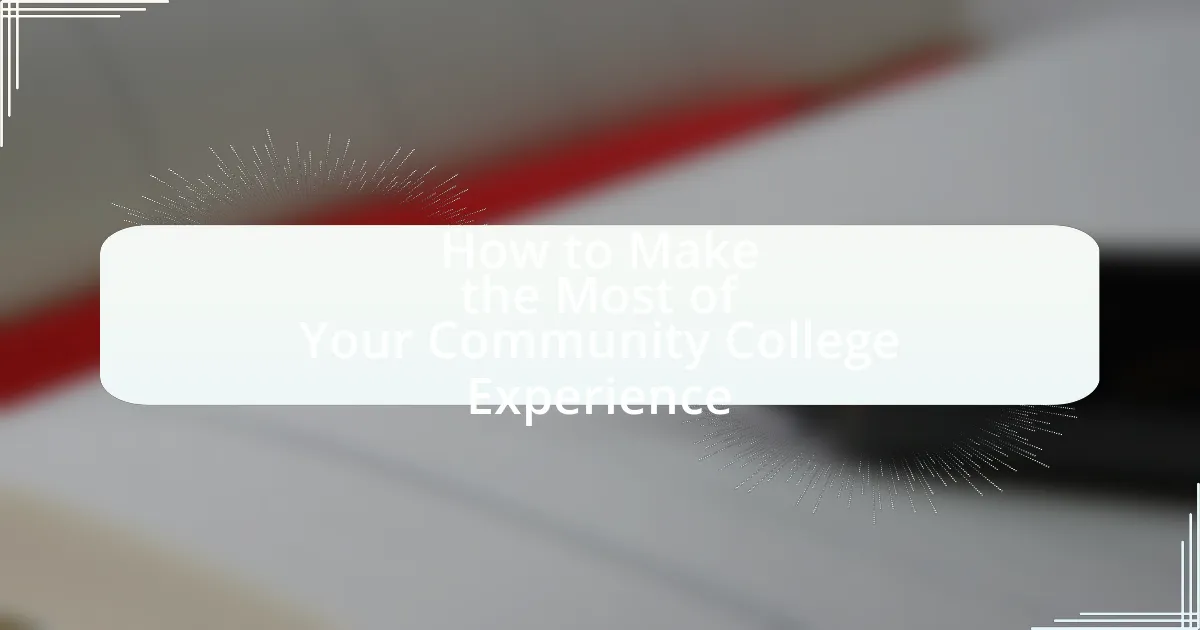The article focuses on maximizing the community college experience, emphasizing the importance of academic engagement, social involvement, and resource utilization for personal and professional growth. It outlines strategies for defining short-term and long-term goals, the significance of personal interests in goal setting, and the benefits of engaging with the college environment. Additionally, it discusses available resources, effective time management techniques, and the role of extracurricular activities in enhancing skills and networking opportunities. The article also addresses common challenges faced by students and offers solutions for overcoming them, ensuring a comprehensive guide for success in community college.

What does it mean to make the most of your community college experience?
Making the most of your community college experience means actively engaging in academic, social, and extracurricular opportunities to maximize personal and professional growth. This involves utilizing resources such as academic advising, tutoring services, and career counseling to enhance educational outcomes. Participation in clubs, organizations, and networking events fosters connections that can lead to internships and job opportunities. Research indicates that students who engage in campus activities and seek support services are more likely to achieve their academic goals and successfully transfer to four-year institutions.
How can students define their goals for community college?
Students can define their goals for community college by assessing their academic interests, career aspirations, and personal development objectives. This process involves identifying specific areas of study or skills they wish to acquire, such as obtaining a degree, transferring to a four-year institution, or gaining vocational training. Research indicates that setting SMART goals—Specific, Measurable, Achievable, Relevant, and Time-bound—can enhance clarity and focus, leading to better outcomes in educational settings. For instance, a study by the American Association of Community Colleges found that students who set clear goals are more likely to persist and succeed in their studies.
What are the short-term and long-term goals students should consider?
Short-term goals students should consider include achieving a specific GPA, completing required courses, and participating in extracurricular activities to enhance their skills and network. These goals help students build a strong academic foundation and foster connections that can be beneficial for future opportunities. Long-term goals should focus on obtaining a degree or certification, transferring to a four-year institution, and developing a clear career path. Research indicates that students who set both short-term and long-term goals are more likely to succeed academically and professionally, as they provide direction and motivation throughout their educational journey.
How do personal interests influence goal setting?
Personal interests significantly influence goal setting by guiding individuals toward objectives that resonate with their passions and values. When individuals align their goals with their interests, they are more likely to remain motivated and committed to achieving them. Research indicates that intrinsic motivation, which stems from personal interests, enhances persistence and performance in goal-directed activities. For instance, a study published in the Journal of Educational Psychology found that students who set goals based on their interests reported higher levels of engagement and academic success. This demonstrates that personal interests not only shape the types of goals individuals pursue but also impact their overall effectiveness in reaching those goals.
Why is it important to engage with the community college environment?
Engaging with the community college environment is important because it enhances academic success and personal development. Active participation in campus activities, such as clubs and organizations, fosters a sense of belonging and community, which has been shown to improve retention rates. According to a study by the Community College Research Center, students who engage with their college environment are more likely to complete their degrees, as they develop essential skills, networks, and support systems that contribute to their overall educational experience.
What opportunities for engagement exist within community colleges?
Community colleges offer various opportunities for engagement, including student organizations, academic clubs, community service programs, and events that foster social interaction. These platforms allow students to connect with peers, develop leadership skills, and enhance their educational experience. For instance, according to the American Association of Community Colleges, over 70% of community colleges have active student government associations, which provide students with a voice in campus decisions and promote civic engagement. Additionally, many community colleges host workshops, seminars, and cultural events that encourage participation and collaboration among students, faculty, and the local community.
How does engagement enhance the overall college experience?
Engagement significantly enhances the overall college experience by fostering a sense of belonging and improving academic performance. When students actively participate in campus activities, such as clubs, organizations, and events, they develop social connections that contribute to their emotional well-being. Research from the National Survey of Student Engagement indicates that students who are involved in extracurricular activities are more likely to persist in their studies and achieve higher grades. This correlation highlights the importance of engagement in creating a supportive community that encourages academic success and personal growth.
What resources are available to support students in community college?
Community colleges offer various resources to support students, including academic advising, tutoring services, financial aid, mental health counseling, and career services. Academic advising helps students navigate course selections and degree requirements, ensuring they stay on track for graduation. Tutoring services provide additional academic support in subjects where students may struggle, enhancing their understanding and performance. Financial aid resources, such as scholarships and grants, assist students in managing tuition costs, while mental health counseling offers emotional support and coping strategies. Career services help students explore job opportunities, internships, and resume building, preparing them for the workforce. These resources collectively contribute to a supportive environment that fosters student success in community colleges.
Which academic resources can help students succeed?
Academic resources that can help students succeed include tutoring services, academic advising, library resources, and online learning platforms. Tutoring services provide personalized assistance in various subjects, enhancing understanding and performance; for example, community colleges often offer free tutoring for core subjects like math and writing. Academic advising helps students navigate their educational paths, ensuring they select appropriate courses and meet graduation requirements. Library resources, including access to databases and research materials, support students in their coursework and projects. Online learning platforms, such as Khan Academy or Coursera, offer supplemental educational content that can reinforce classroom learning. These resources collectively contribute to improved academic performance and student retention rates in community colleges.
How can students access counseling and support services?
Students can access counseling and support services through their community college’s dedicated counseling center or mental health services office. These centers typically offer a range of resources, including individual counseling sessions, group therapy, and workshops focused on stress management and academic success. Many community colleges also provide online resources and hotlines for immediate support, ensuring that students can reach out for help at any time. Accessing these services often requires scheduling an appointment, which can usually be done via the college’s website or by visiting the counseling center in person.

How can students effectively navigate their community college journey?
Students can effectively navigate their community college journey by actively engaging with academic resources, participating in campus activities, and seeking guidance from advisors. Engaging with academic resources, such as tutoring centers and libraries, enhances understanding of course material and improves academic performance. Participation in campus activities, including clubs and organizations, fosters a sense of community and helps build valuable networking connections. Seeking guidance from academic advisors ensures students stay on track with their educational goals and understand available resources. Research indicates that students who utilize these strategies are more likely to complete their programs and achieve their academic objectives.
What strategies can students use to manage their time effectively?
Students can manage their time effectively by implementing strategies such as prioritizing tasks, creating a structured schedule, and utilizing time management tools. Prioritizing tasks involves identifying urgent and important assignments, which helps students focus on what needs immediate attention. Creating a structured schedule, such as a weekly planner, allows students to allocate specific time blocks for studying, attending classes, and completing assignments. Utilizing time management tools, like digital calendars or task management apps, can enhance organization and remind students of deadlines. Research indicates that students who use structured time management techniques report higher academic performance and lower stress levels, demonstrating the effectiveness of these strategies.
How can prioritizing tasks improve academic performance?
Prioritizing tasks can significantly improve academic performance by enhancing focus and efficiency in completing assignments. When students identify and tackle high-priority tasks first, they allocate their time and energy to the most impactful activities, leading to better understanding and retention of material. Research indicates that students who utilize prioritization strategies often achieve higher grades, as they are more likely to meet deadlines and reduce stress levels, which can negatively affect learning outcomes. For instance, a study published in the Journal of Educational Psychology found that students who practiced effective time management and task prioritization reported improved academic results and lower anxiety levels.
What tools can assist in time management?
Tools that can assist in time management include digital calendars, task management apps, and time tracking software. Digital calendars, such as Google Calendar, allow users to schedule classes, assignments, and events, providing reminders and visual organization. Task management apps like Todoist or Trello enable users to prioritize tasks, set deadlines, and track progress, enhancing productivity. Time tracking software, such as Toggl, helps individuals monitor how they spend their time, allowing for adjustments to improve efficiency. These tools are widely used in educational settings to help students manage their schedules effectively and meet academic deadlines.
How can students build relationships with faculty and peers?
Students can build relationships with faculty and peers by actively participating in class discussions and engaging in campus activities. Engaging in these interactions fosters a sense of community and allows students to connect with faculty members and fellow students on a personal level. Research indicates that students who participate in extracurricular activities are more likely to form meaningful relationships, as these settings provide opportunities for collaboration and socialization. For example, a study published in the Journal of College Student Development found that involvement in student organizations significantly enhances peer relationships and faculty interactions, leading to a more enriching college experience.
What are the benefits of networking in community college?
Networking in community college provides students with valuable connections that can enhance their educational and career opportunities. By building relationships with peers, faculty, and industry professionals, students gain access to job leads, internships, and mentorships that are crucial for career advancement. Research indicates that 70% of jobs are found through networking, highlighting its importance in the job market. Additionally, networking fosters collaboration and support among students, which can lead to academic success and personal growth.
How can students approach faculty for mentorship?
Students can approach faculty for mentorship by initiating a respectful and direct conversation, either in person during office hours or through a well-crafted email. This approach allows students to express their interest in the faculty member’s expertise and seek guidance on academic or career-related matters. Research indicates that students who actively seek mentorship are more likely to achieve academic success and career advancement, as mentorship provides valuable insights and networking opportunities.
What role do extracurricular activities play in the community college experience?
Extracurricular activities play a crucial role in enhancing the community college experience by fostering personal development, social connections, and academic success. Participation in clubs, sports, and volunteer opportunities allows students to build leadership skills, improve time management, and engage with peers, which can lead to a more fulfilling college life. Research indicates that students involved in extracurricular activities are more likely to persist in their studies and achieve higher academic performance, as noted in a study published in the Journal of College Student Development, which found that engagement in such activities correlates with increased retention rates and overall satisfaction with the college experience.
How can involvement in clubs and organizations enhance skills?
Involvement in clubs and organizations enhances skills by providing practical experiences that foster teamwork, leadership, and communication abilities. Engaging in these activities allows individuals to apply theoretical knowledge in real-world scenarios, thereby improving problem-solving skills and adaptability. For instance, a study by the American Association of Community Colleges found that students who participated in extracurricular activities reported higher levels of engagement and skill development compared to those who did not. This evidence supports the notion that active participation in clubs and organizations is a vital component of skill enhancement in a community college setting.
What types of extracurricular activities are typically available?
Extracurricular activities typically available at community colleges include student government, clubs related to academic interests, cultural organizations, sports teams, and volunteer opportunities. These activities provide students with avenues for leadership, social interaction, and skill development. For instance, according to the American Association of Community Colleges, over 70% of community colleges offer student clubs and organizations that cater to diverse interests, enhancing the overall educational experience.

What are the best practices for maximizing your community college experience?
To maximize your community college experience, actively engage in campus activities and utilize available resources. Participation in clubs, organizations, and events fosters connections with peers and faculty, enhancing your social network and academic support. Additionally, taking advantage of academic advising, tutoring services, and career counseling can significantly improve your educational outcomes. Research indicates that students who engage in campus life and seek academic support are more likely to achieve higher grades and complete their programs (National Center for Education Statistics, 2020).
How can students develop effective study habits?
Students can develop effective study habits by establishing a consistent study schedule, utilizing active learning techniques, and creating a conducive study environment. A consistent study schedule helps students allocate specific times for studying, which can improve retention and understanding of material. Active learning techniques, such as summarizing information, teaching concepts to peers, and practicing retrieval, enhance engagement and memory retention. Additionally, a conducive study environment, free from distractions and equipped with necessary resources, supports focus and productivity. Research indicates that students who implement structured study routines and active learning strategies tend to achieve higher academic performance, as evidenced by studies showing improved grades and comprehension levels among those who adopt these practices.
What techniques can improve retention and understanding of material?
Active learning techniques, such as summarization, self-explanation, and teaching others, can significantly improve retention and understanding of material. Research indicates that engaging with the material through summarization helps reinforce key concepts, while self-explanation encourages deeper processing of information. A study by Fiorella and Mayer (2016) published in the Journal of Educational Psychology found that students who taught material to peers demonstrated better retention and understanding compared to those who studied passively. Additionally, spaced repetition, which involves reviewing material at increasing intervals, has been shown to enhance long-term retention, as supported by Ebbinghaus’s forgetting curve theory. These techniques collectively foster a more effective learning environment, leading to improved academic performance in community college settings.
How can students create a conducive study environment?
Students can create a conducive study environment by organizing their study space to minimize distractions and enhance focus. This includes selecting a quiet location, ensuring adequate lighting, and keeping necessary materials within reach. Research indicates that a well-organized environment can improve concentration and retention, as demonstrated in a study published in the Journal of Educational Psychology, which found that students in clutter-free spaces performed better academically. Additionally, personalizing the study area with motivational items can further enhance engagement and productivity.
What tips can help students prepare for transferring to a four-year institution?
Students can prepare for transferring to a four-year institution by researching potential schools and understanding their transfer requirements. This involves reviewing the academic programs, admission criteria, and deadlines of the target institutions. Additionally, maintaining a strong GPA and completing transferable courses are crucial, as many four-year colleges require a minimum GPA for transfer students, often around 2.5 to 3.0. Engaging with academic advisors at both the community college and prospective four-year institutions can provide tailored guidance and ensure that students are on track with their transfer plans. Furthermore, participating in extracurricular activities and building relationships with faculty can enhance a student’s application, as many institutions consider holistic factors beyond academics.
How should students research potential transfer schools?
Students should research potential transfer schools by evaluating academic programs, campus culture, and transfer policies. First, they should identify schools that offer programs aligned with their career goals and interests, ensuring that the curriculum meets their educational needs. Next, students should explore campus culture by visiting campuses, attending events, or connecting with current students to gauge the environment and community. Additionally, understanding transfer policies is crucial; students should review each school’s requirements for transfer credits, application deadlines, and support services for transfer students. This comprehensive approach allows students to make informed decisions about their transfer options.
What steps are necessary to ensure a smooth transfer process?
To ensure a smooth transfer process from community college to a four-year institution, students should follow these steps: first, research potential transfer schools to understand their admission requirements and deadlines. This includes reviewing transfer credit policies, which can vary significantly between institutions. Next, maintain a strong academic record, as many universities have minimum GPA requirements for transfer students. Additionally, students should meet with an academic advisor to create a transfer plan that aligns with their educational goals and ensures that they complete necessary prerequisites. Finally, gather all required documentation, such as transcripts and letters of recommendation, well in advance of application deadlines to avoid last-minute issues. These steps are essential for a successful transition, as they help students navigate the complexities of transferring and maximize their chances of acceptance into their desired programs.
What common challenges do students face in community college, and how can they overcome them?
Students in community college commonly face challenges such as financial constraints, time management issues, and feelings of isolation. To overcome financial constraints, students can seek financial aid, scholarships, and part-time work opportunities, as approximately 60% of community college students rely on financial aid to cover their expenses. Time management can be improved by utilizing planners and prioritizing tasks, which is essential since studies show that effective time management can enhance academic performance. To combat feelings of isolation, students should engage in campus activities and form study groups, as social connections have been linked to increased retention rates in community colleges.
How can students deal with academic pressure and stress?
Students can deal with academic pressure and stress by implementing effective time management strategies, practicing mindfulness, and seeking support from peers and faculty. Research indicates that students who utilize time management techniques, such as prioritizing tasks and creating schedules, experience lower stress levels and improved academic performance. Additionally, mindfulness practices, such as meditation and deep-breathing exercises, have been shown to reduce anxiety and enhance focus, contributing to better coping mechanisms. Furthermore, engaging with support systems, including study groups and counseling services, provides students with emotional and academic assistance, which is crucial for managing stress effectively.
What resources are available for financial assistance and budgeting?
Financial assistance and budgeting resources include federal and state grants, scholarships, work-study programs, and financial literacy workshops. Federal grants such as Pell Grants provide need-based financial aid to eligible students, while state grants often support residents attending community colleges. Scholarships, offered by various organizations and institutions, can significantly reduce tuition costs. Work-study programs allow students to earn money while attending school, helping to cover living expenses. Additionally, many community colleges offer financial literacy workshops that teach budgeting skills and money management, equipping students with the knowledge to make informed financial decisions.

Leave a Reply